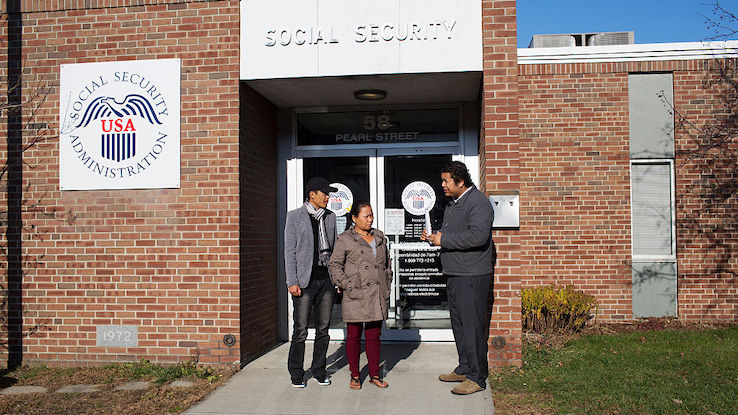How Much Money Are You Allowed To Make And Be On Full Social Security

If you're thinking about retiring soon or are nearing your 60th birthday, you lot're probably also starting to wonder more virtually Social Security benefits. There's a lot to learn and some of the rules can get complex, which tin can brand understanding how and when to get benefits — and what they include — somewhat of a claiming. Before you brainstorm the procedure of applying for Social Security, go started by reviewing some of the basics about the program to answer some common questions you might have.
The Background and Purpose of Social Security
Commencement things first: What is Social Security? Originally signed into law by President Franklin D. Roosevelt in 1935, what we call Social Security really refers to what's officially known equally Erstwhile Historic period, Survivors and Disability Insurance. It'south funded past payroll taxes — coin paid out past employees via paycheck deductions and by employers — and is a form of social insurance administered past the U.Southward. federal government. This means that it's a program that involves the regime participating in the insurance market to provide extra assistance to certain groups and protect them against financial bug that arise after emergencies.

Perhaps the best-known and largest component of Social Security is the retirement benefits it pays out. In that case, these payments are intended to go along people who worked lower-wage jobs throughout their lives from living in relative poverty when they leave the workforce as they age. However, the Social Security Administration (SSA) also makes payments to people with disabilities who cannot piece of work and to survivors of workers who've died. According to the SSA, the purposes of these payments are "to provide for the textile needs of individuals and families, "to protect aged and disabled persons against the expenses of illnesses that may otherwise apply up their savings" and "to keep families together."
It's of import to note that Social Security benefits are intended to exist supplemental — that is, they're non supposed to serve as someone's sole source of income when they retire. The do good payments are meant to provide a boost to other retirement income, such as a pension.
Social Security Eligibility: The Credit System
Depending on your life circumstances, you could be eligible to receive Social Security benefits at any age — not merely the traditional retirement age of 62. For example, to receive disability benefits, you may be eligible at almost whatsoever age as long as you lot've worked long enough and recently enough and have a qualifying medical status that limits your ability to work. You lot may also be able to receive survivors benefits in some circumstances if yous're a surviving family unit member of a deceased person who "worked long enough in jobs insured nether Social Security to qualify for benefits."

Disability and survivors do good payments have relatively straightforward eligibility requirements to meet. Social Security retirement benefits do as well, only the ways eligibility and amounts are determined and the details involved tin can wait somewhat complicated at first glance. Understanding eligibility for Social Security benefits involves learning about credits first.
Your eligibility for receiving Social Security is based in office on credits that yous earn while working. When you're employed and Social Security taxes are deducted from your paycheck for receipt by the Internal Revenue Service (IRS) you commencement earning credits. These credits are based on the amount of money y'all earn each yr, and you lot tin earn up to four credits per year. For instance, in 2020, earning $1,410 in wages at your job earns you lot one credit. Using this number every bit another example, once you lot've earned $5,640 ($1,410 10 4) in wages from your job, yous've earned your four credits for the year and cannot earn more credits until the next year. The base amount of money you demand to earn from your chore to earn one credit increases slightly each year to account for aggrandizement.
To authorize to receive Social Security retirement benefits, you must earn at least forty credits, which equates to 10 years' worth of piece of work. You don't need to piece of work 10 consecutive years to earn the credits, however. Any credits you receive remain on your Social Security record, and if you leave a chore and render to the workforce years later, yous can brainstorm accumulating credits again until you accomplish 40 and become eligible for benefits payments.
The number of credits needed to make up one's mind your eligibility for inability or survivors benefits depends on your historic period; mostly speaking, the younger you are, the fewer the number of credits is that you need to get eligible. The age table on the Social Security Administration'southward website can give you a better idea of the number of credits relative to your age that you lot'll need to take earned to determine eligibility for inability or survivors benefits.
What Role Does Your Historic period Play?
As mentioned, historic period tin exist a determining factor in the number of credits y'all'll need for eligibility for ii types of payments. However, when it comes to retirement benefits, your age can also play a role in not only when you're eligible to start receiving payments but also in the amounts of those payments. In item, you'll want to remember about the age at which you decide to beginning challenge your Social Security retirement payments.

The age when you start claiming determines whether you receive 100% of your Social Security benefits. If you're eligible to receive Social Security retirement benefits, you lot can start getting them every bit early on every bit historic period 62. However, your payment amounts will exist less than they are if you lot wait until what's called your "full retirement historic period." This is the historic period at which you're eligible to receive 100% of your benefit amount every calendar month, and it's typically betwixt ages 66 and 67, depending on the year y'all were built-in. So, drawing earlier than your full retirement age results in yous receiving a reduced corporeality in benefits — the Social Security Administration notes that yous'll get about 28% less than you would if you await until historic period 66.
Waiting until you're older than total retirement historic period to quit working and draw benefits can as well bear on the amount you receive every calendar month. Considering you're working longer, you'll receive a larger monthly amount than if you lot retired at 66. For each month you lot delay claiming benefits, the corporeality y'all can receive monthly increases slightly, and if you wait until age 70, you'll get 132% of your Social Security benefit amount. Once you turn 70 and oasis't started claiming even so, your benefit amount won't keep increasing, and then that 132% is the most y'all can get each calendar month if you delay claiming to continue working.
Source: https://www.askmoney.com/investing/understanding-your-social-security-benefits?utm_content=params%3Ao%3D1465803%26ad%3DdirN%26qo%3DserpIndex
Posted by: andersenliontion.blogspot.com



0 Response to "How Much Money Are You Allowed To Make And Be On Full Social Security"
Post a Comment